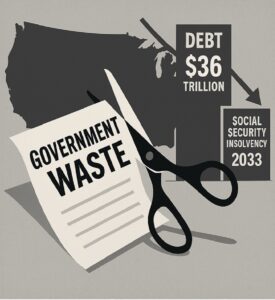The United States is currently grappling with a national debt exceeding $36 trillion, a figure that continues to escalate. This mounting debt has significant implications, including the projection that Social Security’s Old-Age and Survivors Insurance (OASI) trust fund may become insolvent by 2033, potentially leading to a 17% reduction in benefits for recipients. House Budget Committee+1Committee for Responsible Budget+1
Compounding these fiscal challenges is the issue of government inefficiency. The Government Accountability Office (GAO) estimates that the federal government loses between $233 billion to $521 billion annually due to fraud, waste, and abuse. This substantial loss underscores the urgent need for comprehensive reforms aimed at enhancing transparency and accountability within federal spending.GAO
In response to these concerns, the Department of Government Efficiency (DOGE), under the leadership of Elon Musk, has initiated efforts to identify and eliminate wasteful expenditures. These actions have sparked a spectrum of reactions, with some individuals expressing support for the initiative, while others voice opposition. The debate highlights the complexities involved in addressing fiscal responsibility and the diverse perspectives on how best to achieve it.businessinsider.com
As the nation confronts these economic challenges, it is imperative to move beyond partisan divides and focus on collaborative solutions. Prioritizing fiscal responsibility and ensuring the sustainability of essential programs like Social Security require a concerted effort from policymakers, stakeholders, and citizens alike. By fostering open dialogue and implementing effective oversight mechanisms, we can work towards a more stable and equitable financial future for all Americans.
Social Security going bankrupt would have devastating consequences for millions of Americans who rely on this program as their primary source of income in retirement. Without Social Security, many elderly and disabled individuals would be left with no means to support themselves financially, leading to widespread poverty and suffering. Furthermore, Social Security provides a safety net for those who are unable to work due to disability or illness, ensuring that they have access to essential resources to meet their basic needs.
Without this financial assistance, many vulnerable individuals would be left without the means to afford healthcare, housing, and other essential services. Additionally, Social Security plays a crucial role in reducing inequality and promoting economic stability. By providing a guaranteed source of income for retirees, Social Security helps to prevent widespread poverty among the elderly population and reduces the strain on other social welfare programs.
If Social Security were to go bankrupt, it would likely lead to increased reliance on other government assistance programs, as well as higher rates of poverty and homelessness among vulnerable populations. This would place a significant burden on the economy and society as a whole, further exacerbating existing social and economic disparities.
In conclusion, the potential bankruptcy of Social Security would have far-reaching and devastating consequences for millions of Americans. It is crucial that policymakers take action to ensure the long-term sustainability of this vital program in order to protect the well-being and financial security of all citizens.
